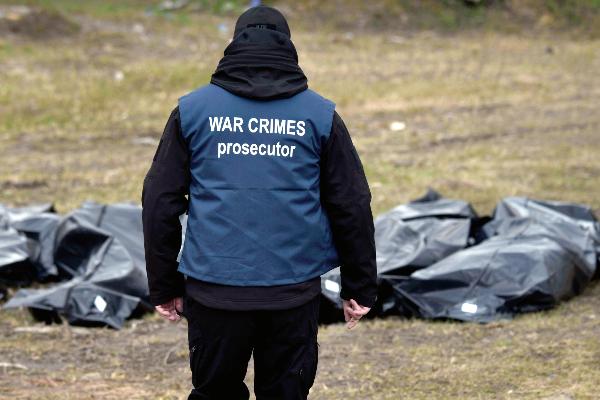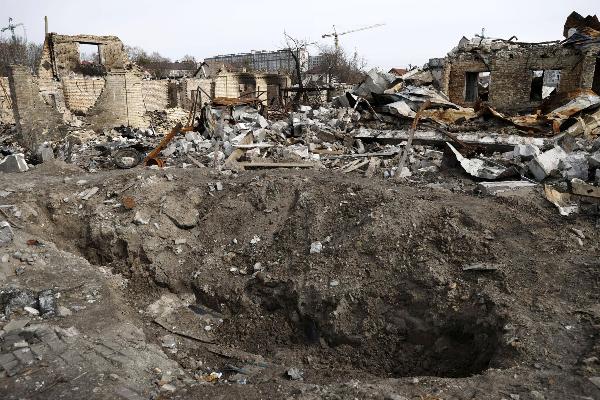The searing images are awful to behold: bombed-out apartment blocks, whole cities reduced to rubble, corpses of civilians, mass graves. Since the reports from the town of Bucha near Kyiv at the latest, there has been a growing focus on war crimes by the Russian army in the fight for Ukraine. Does this mean that the discourse about the violence has entered a new phase?
Prade-Weiss: If on top of the other forms of mass violence – such as forced migration, strategic bombardment, and forced starvation – we’re now seeing massacres, this represents an escalation, certainly. But it does not come as a surprise, any more than the openness with which these gruesome acts are being practiced. Researchers agree on this point: one of the objectives of massacres is to demonstrate power; they are a particularly cynical device. The fact that legal terms such as “war crimes” are so often on our lips is a typical response. And this is not surprising either – after all, we want to legally apprehend and condemn the terrible injustice and subsequently to prosecute the perpetrators. All this is proper and important. At the same time, we’re seeing that the international law is often not sufficient to lead the way in international conflicts. This begins in the present case with Putin’s spreading of conceptual confusion, using the accusation of a supposed genocide to justify his war of aggression.
Why this curiously heightened rhetoric?
Frankly, I felt very queasy when Putin spoke of genocide. Morally and legally, this is the apex of international conflict. As absurd as it may seem to us, we need to take this justification very seriously. We cannot just view it as a mere pretext to geostrategic or material interests. Many people would like to think: Well, Putin is a madman and these speeches are hollow. But they are not hollow – they attest to an individual and collective self-image as being in the right. With the claim of wanting to prevent a genocide and denazify their neighbor, Putin is positioning himself on the side of justice, at least rhetorically. It’s important to know that the term “denazification” has different associations in Russia than it has in Western Europe. In the Stalinist era, denazification was not a legal process of grappling with the past, but about full-on purges – murdering people, to be blunt. It is a deliberate ambivalence that Putin is cultivating: he is exploiting a language that is seen internationally as morally good while also evoking very violent historical models.
Russia insists upon security guarantees and thus effectively asserts that sovereign nations in its vicinity can no longer exercise their right of self-determination, such as the right to form alliances.
Prof. Dr. Juliane Prade-Weiss, Professor of Comparative Literature at LMU, with a special focus on Eastern European literatures.
April 11, 2022, Bucha, Ukraine
Investigators begin the grim task of pulling bodies from a mass grave behind the Church of St. Andrew and All Saints, while assessing evidence of war crimes. Wreckage of war and bodies littered the streets of Bucha, recently liberated from invading Russian troops in the suburbs of Kyiv where atrocities have been reported.
© IMAGO/ZUMA Wire
An interesting rhetorical trap
This logic of justification seems to be having the desired effect in Russia. How come?
After the Second World War, a narrative has been built up over many years in the Soviet Union and Russia that portrays the country as the true vanquisher of National Socialism. In the post-Soviet era under Yeltsin, it crumbled somewhat, but has been reconstructed again under Putin for a long time now. This is not something that has happened suddenly – it’s just that the narrative has escaped the notice of the rest of the world, because it’s leveraged for internal political purposes. It’s joined by a complementary myth that ascribes a merely reactive role to Russia in the current conflict. The country is just responding to the expansion of NATO, so the story goes. And it’s an interesting rhetorical trap, in a sense, to claim that Ukraine is an outpost of NATO. Then Russia launches the attack, and sure enough NATO has to take a position. Both narratives are related to the conviction that Russia must seek to restore its position as a major world power. After all, Putin said many years ago that the collapse of the Soviet Union was the greatest drama in recent Russian history.
Does this justification propaganda have parallels in history?
I should preface my answer by saying that drawing historical parallels is not to imply that everything is the same. But it seems to me that the supposedly legitimate demand for security is a significant pattern we can discern. Russia insists upon security guarantees and thus effectively asserts that sovereign nations in its vicinity can no longer exercise their right of self-determination, such as the right to form alliances. We could compare this, for example, with the annexation of the Sudetenland by the Nazis, which was ostensibly about safeguarding the German-speaking population from attacks. And the Munich Agreement gave in to this claim. Naturally, there are also parallels with Russia’s conduct of war in more recent conflicts. Experts in Syria or the Chechen War were able to predict very accurately how Russian troops would proceed against the Ukrainians in a given situation. Admittedly, it is difficult to accept that this war of aggression is not a one-off, but part of a strategy that has been unfolding for many years now.
Destruction in Bucha near Kyiv, April 12, 2022.
A destroyed residential area in Bucha following Russian attacks.
© IMAGO/Kyodo News
The enmities will live on
You have initiated a project that systematically traces precisely such parallels over long timescales.
Yes, I’m collaborating with the contemporary historian Vladimir Petrović from Belgrade, who has studied so-called ethnic cleansing, especially in the former Yugoslavia, and the theologian Dominik Markl in Rome, who specializes in the Old Testament and the ancient Near East. We want to investigate justifications of mass violence, the seriousness of which as a subject is currently all too apparent. What particularly interests us is the fact that the discourses, the narratives, the language, the heuristics that are crafted to justify such violence not only survive these conflicts, but are positively cemented by them.
Cemented?
Very often it is violent conflicts – we see this quite clearly in the former Yugoslavia – that actually give rise to the mutually loathed identities that create the atmosphere in which massacres and mass violence phenomena can occur. Even when the current war is over, the problem it has created will not go away; the enmities it has produced will live on. Although application of international law is badly needed, this cannot by itself resolve this specific problem that narratives justifying mass violence outlive the conflict. We want to identify how this transmission occurs and what can be done to prevent propagation.
For mass violence to be exercised on a grand scale, it requires the participation or at least approval of large parts of the population.
Juliane Prade-Weiss
For social discourses, there is no judge
Why is international law insufficient?
Only individuals can be convicted under these laws. But for mass violence to be exercised on a grand scale, it requires the participation or at least approval of large parts of the population. And the necessary rationalizations are so complex that they continue to function even when individual perpetrators are convicted. For social discourses, there is no judge. Furthermore, they are ambivalent. History books can be used to justify violence, as we see Putin doing, but also to critically analyze, process and reflect on violence. The same goes, of course, for religion, political discourses, popular culture, the media, and literature.
What are the obligations of history writing?
Historical narratives often seek to justify mass violence. They construct references which can encompass a few decades as in Putin’s case, but can also span centuries or even millennia. Repeatedly, we also see justificatory rhetoric that makes use of religious motifs. What is tricky is that the historical narratives that are being asserted there are often incorrect in a straightforward sense. History is always a story based on facts. But the question as to how to combine these facts and, most importantly of all, what conclusions a society draws from the things that happened, is always a question of reconstruction and reinterpretation. However, this leaves the door open to the sinister possibility of using reconstruction not for preventing further mass violence, but precisely for allowing it to happen again.
It’s ghastly to think that these families and their descendants will struggle with the trauma of mass violence for generations.
Juliane Prade-Weiss
If mass violence and its justification have an ideological afterlife, what does this do to the victims – and to the perpetrators? What does it do to their descendants?
The trans-generational transmission of trauma was studied for the first time in holocaust victims. And only in the past few years have we really begun to analyze the trans-generational consequences of the denial of guilt. As unpleasant as it undoubtedly is, we must understand perpetrators in order to prevent such crimes in the future. On both sides, silence often dominates this transmission. Many popular books have since described how the children and even the grandchildren of Nazi perpetrators grew up in this oppressive atmosphere of silence and how it marked their childhoods.
And this silence was also present – this is very widely attested – for the descendants of victims of the holocaust. Not only is this a very heavy burden at the individual psychological level, but it also shapes the society of survivors as a whole. And last but not least, survivors and their descendants often have to continue to live together with perpetrators and their descendants in one society. We still see this, to name just one example, in the former Yugoslavia. Even after the end of the war in the 1990s, the region has not lost the potential for conflict. The division and hatred, fed to a considerable extent by old justification narratives, live on and are apt to lead to further conflicts. And when we see the daily images of the suffering of Ukrainian refugees, it’s ghastly to think that these families and their descendants will struggle with the trauma of mass violence for generations.
Prof. Dr. Juliane Prade-Weiss is Professor of Comparative Literature at LMU, with a special focus on Eastern European literatures. Together with Prof. Dominik Markl (Pontifical Biblical Institute, Rome) and Dr. Vladimir Petrović (Institute for Contemporary History, Belgrade), she initiated the project “Discourses of Mass Violence in Comparative Perspective.”


